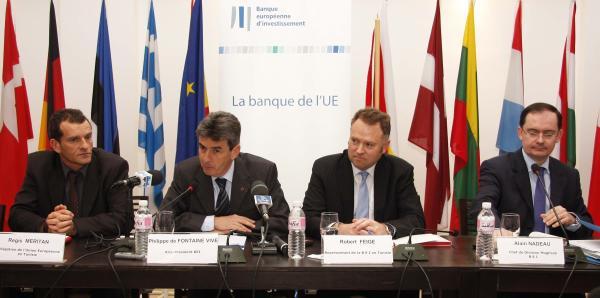
“I have come to Tunis to listen to the Tunisians and support them in their transition to democracy. The action we are proposing to take will be substantial and concrete, focusing on economic growth and the creation of jobs.”
Philippe de Fontaine Vive
EIB Vice-President
On 2 and 3 March, European Investment Bank Vice-President Philippe de Fontaine Vive visited Tunisia to meet the new Tunisian authorities and find out about our partners’ economic and social expectations. The aim was to provide a swift, concerted and effective response to the country’s economic and social priorities. Mr de Fontaine Vive came to listen to the Tunisians. He met the Prime Minister, Mr Beji Caïd Essebsi, a number of members of the Government and representatives of civil society and the private sector.
Following these meetings and discussions, the EIB was able to assess the Tunisians’ priority requirements with regard to economic and social development and proposed, in agreement with the transitional Government, the following courses of action:
- to speed up the implementation of public projects, particularly in the areas of sanitation, energy and road infrastructure (EUR 1bn – nearly MAD 2bn);
- to help with the establishment and development of SMEs by mobilising EIB credit lines with Tunisian banks and leasing companies (EUR 260m – MAD 500m);
- to support the construction of Groupe chimique tunisien’s new Mdhilla plant, a modern unit complying with the highest environmental standards. This support will consolidate the position of this export-oriented group (EUR 140m – MAD 270m);
- to implement a huge nationwide road modernisation programme being carried out by Direction des Ponts et Chaussées (EUR 160m – MAD 310m);
- to finance a number of major projects in the following areas: small and medium-sized enterprises, particularly in less favoured regions, energy (gas), local authority infrastructure across the country (roads, street lighting, drinking water, wastewater treatment, household waste management, social and community facilities), and micro-credit. The overall amount allocated will be around EUR 310m (more than MAD 600m).
The total sum involved will therefore be EUR 1.87bn (more than MAD 3.6bn). These funds will be injected into the Tunisian economy as the projects actually get off the ground.
The projects will have a direct impact on the creation of jobs in Tunisia. They will spearhead European cooperation, which is set to increase significantly in the Mediterranean countries.
“The freedom that the Tunisians are now rediscovering may enable them to achieve an increase in their growth rate of several GDP percentage points per annum”, Mr de Fontaine Vive asserted at this press conference, pointing out that “We are aware that we must act quickly and very effectively so that the hoped for better future does not give way to a major economic and social conflagration.”
In a statement issued on 20 January 2011, the EIB assured the Tunisians of its support in achieving their economic and social priorities. In order to put down lasting roots in society, democracy must be based on economic growth and a development policy that is able to provide everyone with brighter future prospects.
Note to editors:
The EIB, the leading provider of finance to the Mediterranean, via FEMIP
The Facility for Euro-Mediterranean Investment and Partnership (FEMIP) brings together all the instruments made available by the European Investment Bank (EIB) in the Mediterranean partner countries. Operational since October 2002, it is today the key player in the economic and financial partnership between Europe and the Mediterranean, with more than EUR 12.6bn to support economic and social development projects in the nine Mediterranean partner countries.
By increasing the volume of its activity to a record EUR 2.6bn in 2010, including nearly EUR 500m for Tunisia, the EIB has reaffirmed for the future its role as the leading investor in the development of the Mediterranean, with the ability to support the Mediterranean partner countries now in their aspirations with regard to the transition to democracy and economic development and modernisation. This commitment was confirmed on 22 February 2011 at the EIB’s annual press conference in Brussels, when the Bank announced that it was prepared to double its lending to the southern Mediterranean countries, to help them in their transition to democracy. Investment could increase to EUR 6bn by 2013.
The EIB is a long-standing and long-term partner of Tunisia. It is currently the country’s main external financial partner. To date Tunisia has been provided with finance totalling more than EUR 4.4bn; the portfolio of financing operations currently being carried out consists of 61 loans and 20 equity participations in investment funds.
Its operational priorities are focused on modernisation of the economy, job creation and improving the quality of life and living conditions of the people concerned. Its main operations have involved:
- extending the road and motorway networks (the latest being the section between Sfax and Gabès) to facilitate regional trade and encourage the development of more isolated regions, while at the same time reducing the number of accidents;
- other modes of transport, such as Enfidha airport, to support the development of tourism, or in urban areas, such as RFR (the rapid rail network), to improve passenger transport between Tunis and its outlying districts;
- modernising and extending the facilities for generating and distributing energy, in order to produce, in an environmentally friendly manner and at the best possible price, electricity that is available to everyone (latest projects: Sousse power plant and expansion of the network of high-voltage lines);
- programmes for the supply of drinking water, wastewater treatment and cleaning up pollution on industrial sites (Taparura site);
- the programme to modernise and equip public hospitals;
- the development of technology parks, working in conjunction with universities to facilitate the establishment of innovative businesses by young graduates;
- credit lines for small and medium-sized enterprises and financing microcredit via inter-Arab ENDA.

Photographer: EIB ©EIB
Download original